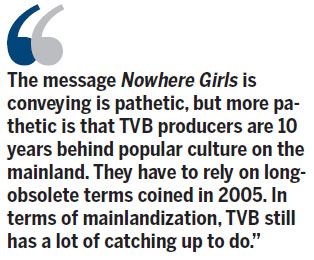TVB still has a lot of catching up to do
Updated: 2014-08-29 04:36
By Jony Lam(HK Edition)
|
|||||||||
Everyone in Hong Kong who considers himself or herself an "intellectual" disdains TVB, one of two free-to-air TV broadcasters in Hong Kong and one of the largest commercial Chinese program producers in the world.
Unsurprisingly, its latest show, labeled "reality" but highly scripted, is again attracting scrutiny.
The show is called Nowhere Girls, which is a very interesting name. The name is a smart translation of the pun intended in the show's Chinese name, which is pronounced as mei nu in Putonghua. Nu means female, and mei means no or nothing, but the word pretty is also pronounced as mei in Putonghua. People in mainland refer to pretty ladies as mei nu, and that's why using a homophone to signify "have-not" women is witty.
Hongkongers seldom refer to a TVB Pearl (the Cantonese channel) program by its English name. In fact, few know what the names in English are. I would not have known if I hadn't been writing this piece. Still, the poor soul responsible for this seldom noticed job came up with Nowhere Girls, which really is the best choice possible. As the saying goes, "nowhere" is "now here." The English title aptly matches the ambiguity in the Chinese counterpart.
When I say Chinese in the preceding paragraphs, I am really referring to Putonghua. In Cantonese, the homophonic effect of the Chinese words is lost, making the title an obvious rip off of a pun which originated from the mainland.
TVB, the city's cultural icon, appropriated a pun from the mainland. But the pun backfired because the pronunciation in Cantonese is not natural. That is one good reason why Hongkongers hate Nowhere Girls.
Writing in the South China Morning Post, columnist Alice Wu said "mocking the so-called 'have-not' women in the name of television entertainment is crass and reflects poorly on society," as"calling women 'have nots' means calling them women with nothing to be proud of." While I totally agree with Wu's criticism of the show, I frowned when later in the piece she asked, "Why do we bemoan 'mainlandization' yet embrace the worst of the social bullying, discrimination and alienation the mainland coughs up?"

Wu, and many other critics, seem to be under the impression that calling people "mei nu", as using the Chinese words that means "have-not women", is a form of bullying in the mainland. Let's see why this is so wrong.
In the mainland, this usage's popularity was short-lived. It appeared around 2005, as the protagonist Kim Sam-soon in South Korean television My Lovely Sam-soon then being aired attracted a massive audience by breaking the stereotype of the typical K-Drama Cinderella. Touted as the Korean version of Bridget Jones's Diary, My Lovely Sam-soon starred Kim Sun-a (who gained 15 pounds for the role), Hyun Bin, Jung Ryeo-won and Daniel Henney.
Kim Sam-soon is loud and brash, yet insecure about her weight. Coming from a lower middle-class family, she didn't go to college, and she has always been embarrassed by her old-fashioned first name Sam-soon, which means dumb. Yet, at the end of the story she captured the heart of a handsome, rich man with her unassuming personality.
The show left Koreans with a "Sam-soon Syndrome", and the Chinese, the term mei nu. The lesson is that even "have nots" - women with no money, no job, no education, no looks and no sophistication - can live happily and with dignity.
TVB's Nowhere Girls would like us to believe makeovers, working with fitness trainers and life coaches are the answer to leading "better lives". This is, in fact, the opposite of the original meaning of mei nu. But this is only natural, as About Beauty, a local beauty salon chain, sponsors the show.
The message Nowhere Girls is conveying is pathetic, but more pathetic is that TVB producers are 10 years behind popular culture on the mainland. They have to rely on obsolete terms coined in 2005. In terms of mainlandization, TVB still has a lot of catching up to do.
The author is a current affairs commentator.
(HK Edition 08/29/2014 page9)